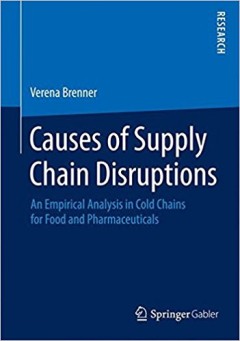Ditapis dengan

Causes of Supply Chain Disruptions An Empirical Analysis in Cold Chains for F…
How can wasteful handling of such precious goods as food and pharmaceuticals be reduced between production and consumption? This was the key question at the beginning of this research project. Having witnessed vivid and frank discussions between logistics experts from all segments of the cold chain in conferences and workshops during my work for the Cool Chain Association (CCA), I became incre…
- Edisi
- 2015
- ISBN/ISSN
- 978-3-658-08662-6
- Deskripsi Fisik
- 332P
- Judul Seri
- Causes of Supply Chain Disruptions
- No. Panggil
- TXT LO BRE c

Causes of supply chain disruptions : an empirical analysis in cold chains for…
- Edisi
- -
- ISBN/ISSN
- 978-3-658-08662-6
- Deskripsi Fisik
- xvi, 323 p.
- Judul Seri
- -
- No. Panggil
- TXT LO BRE c
- Edisi
- -
- ISBN/ISSN
- 978-3-658-08662-6
- Deskripsi Fisik
- xvi, 323 p.
- Judul Seri
- -
- No. Panggil
- TXT LO BRE c

Reverse logistic process control measures for the pharmaceutical industry sup…
The aim of this paper is to analyze the pharmaceutical supply chain using the DMAIC process for improvement of the reverse logistics in a recall to avert the possibility of harm to a consumer.
- Edisi
- Vol. 58 No. 2, 2009
- ISBN/ISSN
- -
- Deskripsi Fisik
- 19 p.
- Judul Seri
- International Journal of Productivity and Performance Management
- No. Panggil
- ATC LO KUM r

The role of supply-chain re-engineering in the pharmaceutical industry
Analyses the role of supply-chain management in the pharmaceutical industry. Uses the pharmaceutical industry as a case study since it is an industry undergoing considerable change and is subject to a wide variety of commercial pressures. Illustrates therefore how logisticians can link the technicalities of their disciplines to the business issues facing their industry.
- Edisi
- Volume 9 · Number 3 · 1996 · 4–10
- ISBN/ISSN
- -
- Deskripsi Fisik
- 9 p.
- Judul Seri
- Logistics Information Management
- No. Panggil
- ATC LO BOO t

Reverse logistics in the pharmaceuticals industry: a systemic analysis
The purpose of this paper is to present a systemic analysis of the complex interaction of factors affecting the reverse logistics (RL) processes in a pharmaceutical supply chain (PSC).
- Edisi
- Vol. 25 No. 2, 2014
- ISBN/ISSN
- -
- Deskripsi Fisik
- 22 p.
- Judul Seri
- The International Journal of Logistics Management
- No. Panggil
- ATC LO PAT r

The benefits of reverse logistics: the case of the Manchester Royal Infirmary…
Describes a research project carried out within the Manchester Royal Infirmary (MRI) to evaluate and improve the recycling and disposal of pharmaceutical products. Discusses supply chain management practices in the National Health Service and, in particular, focuses on the concept of reverse logistics (the recycling of pharmaceutical stock for later re‐use). The research involved the analysis…
- Edisi
- Vol. 5 Issue: 5, pp.226-234
- ISBN/ISSN
- -
- Deskripsi Fisik
- 10 p.
- Judul Seri
- Supply Chain Management: An International Journal
- No. Panggil
- ATC LO RIT t

Healthcare supply chain management in Malaysia: a case study
The purpose of this paper is to evaluate inventory management in the private healthcare sector in Malaysia, with a particular focus on the distribution of medicines from a wholesaler to clinics. Currently, there are issues with service levels to clinics that need addressing.
- Edisi
- Volume 14 · Number 3 · 2009 · 234–243
- ISBN/ISSN
- -
- Deskripsi Fisik
- 12 p.
- Judul Seri
- Supply Chain Management: An International Journal
- No. Panggil
- ATC LO POT h

Forces, trends, and decisions in pharmaceutical supply chain management
The purpose of this paper is to identify and examine the major forces that are changing the way biopharmaceutical medications are purchased, distributed, and sold throughout the supply chain. This will become important as healthcare reform moves forward, and logistics will be transformed in this industry.
- Edisi
- Vol. 41 No. 6, 2011 pp. 601-622
- ISBN/ISSN
- -
- Deskripsi Fisik
- 24
- Judul Seri
- International Journal of Physical Distribution & Logistics Management
- No. Panggil
- ATC LO ROS f

Customer value assessment of pharmaceutical marketing in Taiwan
The purpose of this study is to provide a data mining approach for classifying Taiwanese healthcare institutions based on customer value assessment. Each institution type has developed its own marketing strategy along with relationship management strategies.
- Edisi
- Vol. 113 No. 9, 2013 pp. 1315-1333
- ISBN/ISSN
- -
- Deskripsi Fisik
- 20 p.
- Judul Seri
- Industrial Management & Data Systems
- No. Panggil
- ATC LO YIH c

Beyond MRP: the development of a modern scheduling system
Production scheduling is being focused on increasingly as a critical company activity. Consequently, it is becoming commonplace to hear of finite capacity scheduling systems being linked to existing MRP‐type systems, to provide a more detailed and flexible scheduling mechanism. But how easy is it to accomplish? Focuses on a user′s (a well‐known pharmaceutical company) journey to such a …
- Edisi
- Vol. 8 Issue: 1, pp.17-23
- ISBN/ISSN
- -
- Deskripsi Fisik
- 8 p.
- Judul Seri
- Logistics Information Management
- No. Panggil
- ATC LO EXE b
 Karya Umum
Karya Umum  Filsafat
Filsafat  Agama
Agama  Ilmu-ilmu Sosial
Ilmu-ilmu Sosial  Bahasa
Bahasa  Ilmu-ilmu Murni
Ilmu-ilmu Murni  Ilmu-ilmu Terapan
Ilmu-ilmu Terapan  Kesenian, Hiburan, dan Olahraga
Kesenian, Hiburan, dan Olahraga  Kesusastraan
Kesusastraan  Geografi dan Sejarah
Geografi dan Sejarah